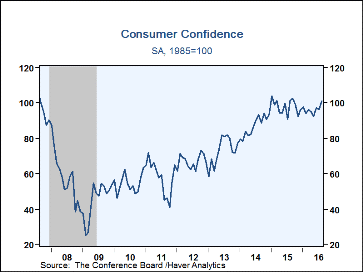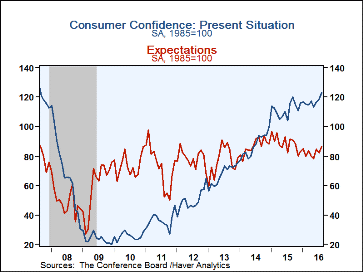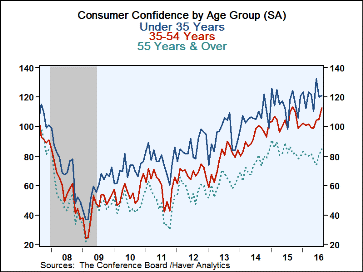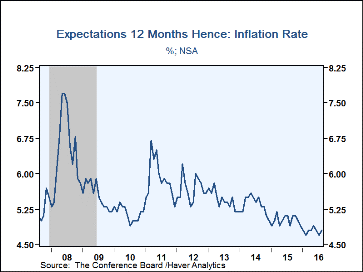 Global| Aug 30 2016
Global| Aug 30 2016U.S. Consumer Confidence Improves Broadly
by:Tom Moeller
|in:Economy in Brief
Summary
The Conference Board's Consumer Confidence Index increased 4.6% to 101.1 (-0.2% y/y) during August from 96.7 in July, revised from 97.3. The latest figure was at the highest level since September and surpassed expectations for 97.0 in [...]
The Conference Board's Consumer Confidence Index increased 4.6% to 101.1 (-0.2% y/y) during August from 96.7 in July, revised from 97.3. The latest figure was at the highest level since September and surpassed expectations for 97.0 in the Action Economics Forecast Survey. During the last ten years, there has been a 70% correlation between the level of confidence and the y/y change in real consumer spending.
The present situations reading of confidence rose 3.5% (6.2% y/y) to 123.0, the highest level since August 2007. The expectations reading increased 5.4% to 86.4 (-5.7% y/y), the highest level since October.
By age group, confidence amongst those aged 35-54 years rose 7.5% (2.5% y/y) to the highest level since September. Confidence amongst respondents over age 55 improved 4.7% (-2.4% y/y) to the highest level in twelve months. Amongst those aged under 35, confidence rose 0.7% (2.5% y/y), but remained below the June high.
Details show that the present situation improvement reflected a jump in the perception that business conditions were good, bringing it to the highest level since March 2001. Jobs were viewed as plentiful by the greatest percentage of respondents since 2007, and jobs were viewed as hard to get by 23.4% of respondents, near the recovery low. Expectations for business conditions in six months improved to the most favorable reading since October. Perceptions about employment opportunities also rose to the highest level since October, but the perception of income improvement was even stronger.
Higher price inflation in six months was expected by a low 4.8% of respondents. Higher interest rates in twelve months were expected by 54.3% of respondents, down from 72.6% in January.
A raised 1.4% of respondents expected to buy a new home in the next six months, the most since December. A slightly higher 50.3% intended to buy a major appliance, but 3.7% planned to buy a new car, down from 5.4% just two months ago.
The Consumer Confidence data is available in Haver's CBDB database. The total indexes appear in USECON, and the market expectations are in AS1REPNA
Projecting the Long-Run Natural Rate of Interest from the Federal Reserve Bank of San Francisco is available here.
| Conference Board (SA, 1985=100) | Aug | Jul | Jun | Y/Y % | 2015 | 2014 | 2013 |
|---|---|---|---|---|---|---|---|
| Consumer Confidence Index | 101.1 | 96.7 | 97.4 | -0.2 | 98.0 | 86.9 | 73.2 |
| Present Situation | 123.0 | 118.8 | 116.6 | 6.2 | 111.7 | 87.4 | 67.6 |
| Expectations | 86.4 | 82.0 | 84.6 | -5.7 | 88.8 | 86.6 | 77.0 |
| Consumer Confidence By Age Group | |||||||
| Under 35 Years | 120.9 | 120.1 | 132.3 | 2.5 | 116.0 | 106.6 | 93.1 |
| Aged 35-54 Years | 112.7 | 104.8 | 104.7 | 2.5 | 103.9 | 92.4 | 76.8 |
| Over 55 Years | 84.7 | 80.9 | 73.9 | -2.4 | 84.1 | 73.8 | 61.2 |
Tom Moeller
AuthorMore in Author Profile »Prior to joining Haver Analytics in 2000, Mr. Moeller worked as the Economist at Chancellor Capital Management from 1985 to 1999. There, he developed comprehensive economic forecasts and interpreted economic data for equity and fixed income portfolio managers. Also at Chancellor, Mr. Moeller worked as an equity analyst and was responsible for researching and rating companies in the economically sensitive automobile and housing industries for investment in Chancellor’s equity portfolio. Prior to joining Chancellor, Mr. Moeller was an Economist at Citibank from 1979 to 1984. He also analyzed pricing behavior in the metals industry for the Council on Wage and Price Stability in Washington, D.C. In 1999, Mr. Moeller received the award for most accurate forecast from the Forecasters' Club of New York. From 1990 to 1992 he was President of the New York Association for Business Economists. Mr. Moeller earned an M.B.A. in Finance from Fordham University, where he graduated in 1987. He holds a Bachelor of Arts in Economics from George Washington University.
More Economy in Brief
 Global| Feb 05 2026
Global| Feb 05 2026Charts of the Week: Balanced Policy, Resilient Data and AI Narratives
by:Andrew Cates










